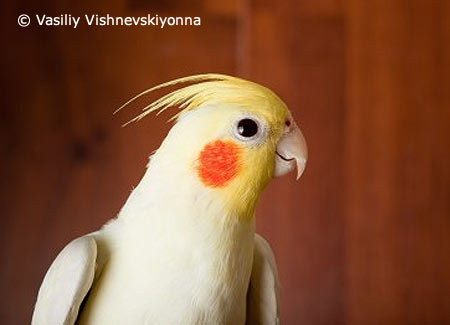Reasons Why Cockatiels Bite

Below are common reasons why a pet cockatiel may bite. Simply click on the biting topic below for more information. If you cannot determine why your cockatiel is biting with the information provided , please post your question on our parrot forum under the cockatiel section or head on over to our main cockatiel area.
- Reasons Why Cockatiels Bite
- Fearful Biting from a Cockatiel
- A Cockatiel Biting Out of Jealousy
- Cockatiel Territorial Biting
- Juvenile Biting in Cockatiels
- Reinforcement of Biting Unintentionally in Cockatiels
A Cockatiel Biting Out of Jealousy
It’s true! Cockatiels do bite out of jealousy and are a lot like
small children that cannot control their surroundings. In fact, some
cockatiels form such strong bonds with their owners that many will do
anything to keep getting their owner’s attention. For example, a common
thing that occurs is that an owner may get bitten just because a family
member gets close to an owner. Because they are territorial, a cockatiel
may bite the owner if it gets a chance in the hopes that the owner will
move away from the family member. This is a natural response and the
cockatiel is only trying to communicate in the only way it knows how.
Rather, the cockatiel perceived this interaction as a threat to its
relationship and reacted quickly to try to solve the problem. If the
family member also gets close to the cockatiel, it may also experience
an unwanted bite.
In the wild, jealousy actually pays off and is beneficial to the
bird. This emotion helps the cockatiels fight off intruders that could
potentially damage their bonded relationships. Both the female and male
depend on each other to raise their family successfully—without both
parents the babies could starve and die. Jealousy is a natural emotion
to ensure each bird understands its boundaries and does not find another
mate while raising their offspring. Though both males and females can
become jealous, it tends to be a stronger emotion in female cockatiels.
Most males will whistle and invite new company while females tend to
express more outright jealousy and territorial behaviors.
Solution: The issue of a jealous biting cockatiel can be solved through
positive reinforcement. The bird should be asked to step onto a perch by
its owner and rewarded for doing so. Once the bird steps onto the perch
without hesitation, the owner should then ask their family members to
try the same exercises with the bird. Once the cockatiel has mastered
this and is not afraid of stepping up unto a perch, the cockatiel should
then be coaxed to step up onto the hand of the owner. Once this is
mastered, then the same process can be repeated with family members.
This will eliminate jealousy and territorial issues with your bird. This
process should be continued daily until the cockatiel is no longer
threatened or feels comfortable with sharing its owner. If the bird
should bite, nothing should be done to reprimand it although difficult
as it may be. Simply move your finger away and continue working with the
bird as if nothing had happened.
Owners and family members should interact and partake in teaching the
bird new tricks so that the cockatiel becomes accustomed to being around
other people. All family members should reward the bird when interacting
with it and should continually provide praise for good repeated
behaviors by the cockatiel.
If the bird appears to not tolerate certain family members or other
people, it’s advantageous that these persons make an effort to interact
with the bird if they are going to be around for any certain length.
Keep in mind that teaching a bird new tricks or behaviors can sometimes
take a long time and it takes a lot of repetition of a particular
process before a bird may react in a certain way. Teaching a bird new
behavior and tricks can be applied during daily cage chores, before
going to work, or before placing the cockatiel to sleep. Eventually the
bird will come to accept new people as it will perceive them as
nonthreatening and will in fact come to enjoy interacting with others as
well as its owner. Just remember to ignore unwanted aggressive behavior.
The owner should make every effort to provide an environment that is
enjoyable to the bird. It’s important for an owner to always be aware of
behavior that will
contribute to the bird becoming territorial and jealous such as petting
the bird when they know that the bird is agitated by other people. This
interaction is looked upon as bonding behavior by the bird and may cause
the bird to feel aggressive if others come near during this time. It is
all about understanding these little subtleties that can make
interacting with a bird successful or not.




